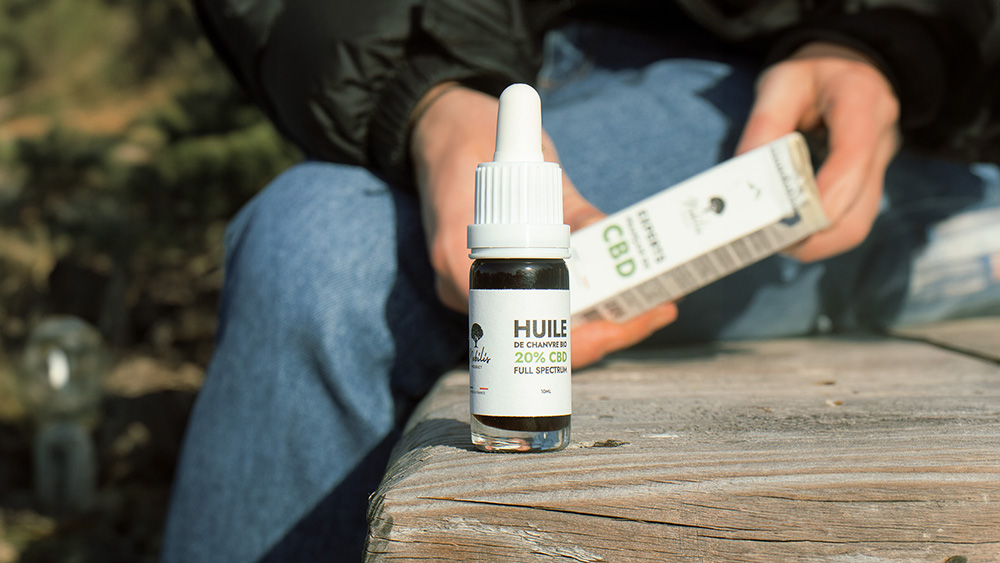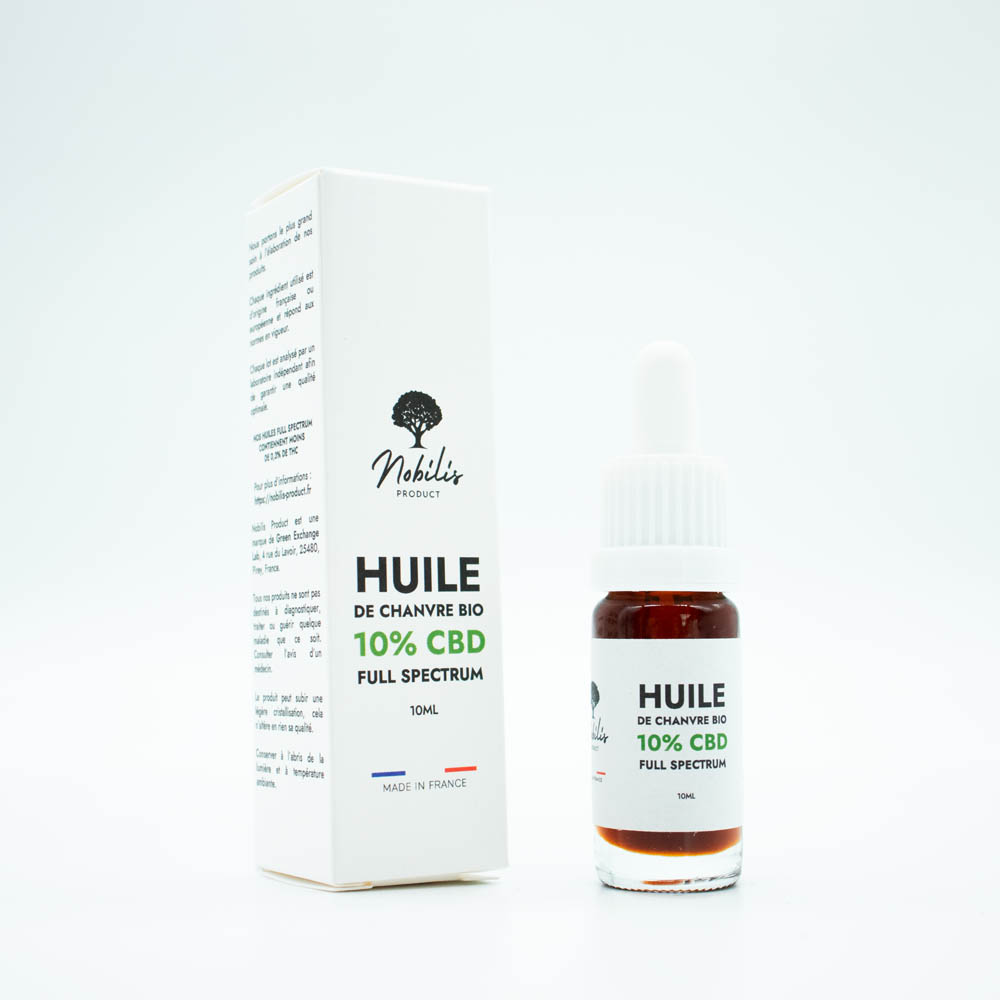
Is the CBD patch useful for back pain?
October 15, 2024
[Study] Anxiety and CBD: human study shows efficacy of full spectrum
November 21, 2024CBD oil is undoubtedly the flagship product of the legal cannabis industry. However, it's also the one that consumers understand the least! Indeed, on closer inspection, there are several different types of CBD oil.
Some contain numerous cannabis-derived molecules (the so-called " full spectrum" products ), while others are made solely from pure CBD extract, the isolate.
Today, we're going to explain why full spectrum CBD oils are far more effective than pure CBD oils.
Table of contents
What is full spectrum?
Remember that CBD oil is an extract of cannabis flowers mixed with a vegetable carrier oil (hemp seed oil, coconut oil, etc.).
When we say that an oil is "full spectrum", we're referring to the cannabis extract it contains. Indeed, manufacturers can choose to extract all the molecules synthesized in the flowers, or to target one in particular, such as CBD.

Cannabis molecules: it's not all CBD and THC!
The THC/CBD duo are the two main molecules synthesized in the trichomes of cannabis flowers. This type of molecule is known as a "phytocannabinoid", although in common parlance the term "cannabinoid" is generally used .
As a reminder, THC (tetrahydrocannabinol) is a psychoactive molecule responsible for the well-known intoxicating effects of recreational cannabis (which contains a high percentage of THC). CBD, on the other hand, is a non-psychotropic molecule responsible for most of the therapeutic properties of medical cannabis.
In any case, polarizing cannabis between THC and CBD may simplify things, but it's important to bear in mind that cannabic chemistry is far more complex than that!
In fact, trichomes - glandular hairs - synthesize literally hundreds of other molecules! And all of them, absolutely all of them, play their part. We'll explain this a little later, in the section on the entourage effect.
Getting back to the molecules of cannabis, here's an overview of what's found in this plant:
- Major phytocannabinoids: CBD and THC;
- Minor phytocannabinoids, each present in small proportions (less than 1%), but together they represent a significant part of the plant's molecular profile. The best-known are CBG (cannabigerol) and CBN (cannabinol), but there are over 200 of them!
- Terpenes, the substances responsible for the taste and smell of plants. And according to some studies, they also have therapeutic properties. They are widely used in aromatherapy (essential oils). The main terpenes in cannabis are myrcene, limonene, pinene and linalool;
- And last but not least, flavonoids, substances responsible for the color of flowers, but also increasingly studied for their properties. One example is cannflavin, the cannabis flavonoid par excellence.
In short, as you can see, it's a lot of people!
Difference full spectrum/ broad spectrum
Before continuing, it's important to clarify the difference between full spectrum and broad spectrum. One is said to be "full", while the other is "wide". But what does this actually mean?
- A full spectrum CBD oil must contain ALL the active molecules of cannabis: cannabinoids, terpenes and flavonoids. This type of oil therefore contains THC, but its percentage is kept below 0.3% in France.
- A broad spectrum CBD oil simply contains a combination of cannabinoids, with or without terpenes. Some brands, such as Nobilis-Product, classify their "THC-free full spectrum CBD oils" as broad spectrum. Indeed, although only one molecule is missing, we believe it would be inaccurate to speak of a full spectrum.
Then there's a third category of oils, those made from isolate. Isolate is a refined form of a molecule in the form of pure crystals. There are CBD, CBG and CBN isolates.
This type of extract is very useful when formulating an oil (or other product), as it's much easier to control the concentration and composition of the final product. However, as we'll see a little later, from a user's point of view,isolates have a number of limitations you need to be aware of.
Cannabis' minor molecules and their importance: not to be underestimated
In all, cannabis flowers synthesize over 450 active molecules !
Although this is becoming less and less true, CBD is the focus of many scientific studies. Some studies focus on the potential sedative properties of CBN, others on the anti-inflammatory power of CBG.
However, when it comes to other molecules, such as flavonoids or terpenes, the scientific literature is a little sketchy. Fortunately, the data are not totally non-existent, giving us a small glimpse of the richness hidden in small-percentage molecules.

Acid forms (CBDa, THCa, and CBGa): mines of therapeutic properties
As we said earlier, cannabis flowers contain THC, CBD, CBN, CBG and so on. But that's not quite true... In fact, if you took a microscope and looked at the molecules in the trichomes, you wouldn't find THC, CBD or any of the other cannabinoids mentioned.
In their "natural" state, cannabinoids are present in their acidic forms: THCa, CBDa, CBGa and so on. It's only when they're heated to a certain temperature for a certain length of time that they're transformed into THC, CBD and CBG. This process is called "decarboxylation". This means that if you eat raw cannabis flowers, even those with a high THC concentration, you won't experience any hallucinogenic effects.
THCa is not psychotropic, but it has many other properties. Just like other acid forms!
CBDa, for example, is said to have powerful anti-inflammatory properties, thanks to its particular affinity with COX-2-type enzymes. Some studies have also shown it to be more effective than CBD itself in reducing anxiety and nausea. THCa, meanwhile, is said to have highly promising neuroprotective properties in the treatment of neurodegenerative diseases such as Alzheimer's and Parkinson's.
What's interesting about full spectrum extract is that it's possible to retain the acidic forms of cannabinoids, and even control the ratio of acidic cannabinoids to decarboxylated cannabinoids.
Cannflavins: cannabis flavonoids
Flavonoids are a family of phytochemicals naturally present in many plants, including fruits, vegetables, teas and herbs. They are the pigments responsible for bright colors, such as the red of tomatoes or the blue of blueberries.
But beyond their aesthetic qualities, flavonoids possess powerful antioxidant properties, making them valuable health allies. These compounds act by neutralizing free radicals in the body, helping to protect cells from oxidative stress, a process linked to aging and many chronic diseases.
Cannflavins are flavonoids specific to cannabis, belonging to the wider family of phytochemicals found in the plant.
Identified mainly in the cannflavin A, B and C forms, they stand out for their particularly powerful anti-inflammatory properties. Studies have shown that cannflavins may be up to thirty times more effective than aspirin in reducing inflammation, without the side effects associated with conventional anti-inflammatory drugs.
The entourage effect: the synergistic action of cannabis molecules
The main argument in favor of full spectrum extracts is the principle of theentourage effect. Put simply, this is the theory that cannabis compounds act synergistically, not in isolation.
For example, CBD (cannabidiol) and THC (tetrahydrocannabinol) are two well-known cannabinoids which, taken individually, produce different effects. When combined, CBD can attenuate some of the psychoactive effects of THC, making the experience milder while retaining the therapeutic effects.
Similarly, terpenes, which give different cannabis varieties their distinct aromas, also influence the overall effect of cannabis. For example, limonene, a terpene present in the majority of cannabis varieties, contributes to the relaxation induced by CBD and THC .
This entourage effect is at the heart of the philosophy behind many full-spectrum cannabis products, which contain all the plant's natural components. Indeed, by promoting a complete approach, the entourage effect maximizes the potential benefits of cannabis for well-being and health, while offering a more harmonious and balanced experience for the user.
Full spectrum versus isolate
As you can see, full spectrum is a rich extract whose composition is as faithful as possible to that of the plant. Isolate, on the other hand, is a purified, refined form of a cannabinoid, usually cannabidiol (CBD).
To sum up a little of what we've just seen, here are a few concrete points to keep in mind when choosing between a full spectrum CBD oil and a CBD isolate oil.
The health benefits of full spectrum
The only slight criticism that can be levelled at Full Spectrum is the presence of THC, which is disturbing for some, despite the fact that at less than 0.3%, the molecule causes no psychoactive effects.
In addition to this aspect, the health benefits of full spectrum are numerous compared to isolate:
- More extensive therapeutic properties, thanks in particular to the entourage effect and the presence of unique molecules. Several studies show that this type of extract helps relieve chronic pain, inflammatory diseases, neurodegenerative problems and anxiety;
- Improves sleep quality and combats insomnia. As mentioned above, certain terpenes (limonene, linalool and myrcene) play an important role in the relaxing effects of cannabis;
- Tenfold anti-inflammatory effect, thanks to the presence of flavonoids such as cannflavins;
- Neuroprotective properties, thanks to the combined action of acid cannabinoids and cannaflavins.
In short, if research continues along the lines of full spectrum, then this type of extract could become a treatment for many illnesses, such as chronic pain, epilepsy, anxiety, sleep disorders and even cancer.
Let's hope that the scientific community will continue to research the properties of full spectrum extracts and the entourage effect , rather than focusing solely on the properties of CBD.
Indeed, a closer look reveals that the applications of CBD isolate are limited...
The limits of CBD in isolate form
Choosing a product that contains ONLY cannabidiol in its pure form means depriving yourself of many of its effects:
- Firstly, as we have seen, cannabis molecules appear to act synergistically (entourage effect). Favoring just one of them, even at higher concentration, may therefore suggest reduced efficacy;
- Secondly, the anti-inflammatory properties of CBD isolate are less effective than those of full spectrum, since this extract does not contain CBG, cannflavins or terpenes ;
- Finally, due to its poor composition, the isolate contains no neuroprotective molecules.
All in all, CBD isolate certainly allows you to take advantage of CBD's relaxing properties, but that's as far as it goes.
Conclusion: is full spectrum the best form of CBD?
As we said, under the principle of the entourage effect, full spectrum CBD oils are potentially more effective than oils containing only cannabidiol in its pure form.
But to enjoy the benefits of full spectrum, it's crucial to buy a quality product ! That's why we recommend that you always ask for the results of laboratory analyses, which guarantee the composition of the product. In this way, you can check that the product in question contains all the molecules of hemp.
Another way to tell if you're dealing with a quality full spectrum oil is to make sure it's made from distillate. In fact, distillate is an extract of hemp flower that contains all the plant's molecular baggage.
At Nobilis-Product, we offer full spectrum (with less than 0.3% THC) and broad spectrum (THC-free) CBD oils. They are made with organic hemp flower distillate, and we systematically deliver the corresponding laboratory analysis report.
Please do not hesitate to contact us if you have any questions about our products or their use.
Before I leave you, please note that everything we've just said about the full spectrum doesn' t just apply to oils! It's just as true for cosmetics, vape products and edibles. In fact, CBD products can be made with distillate (and all the molecules of hemp) or isolate.





